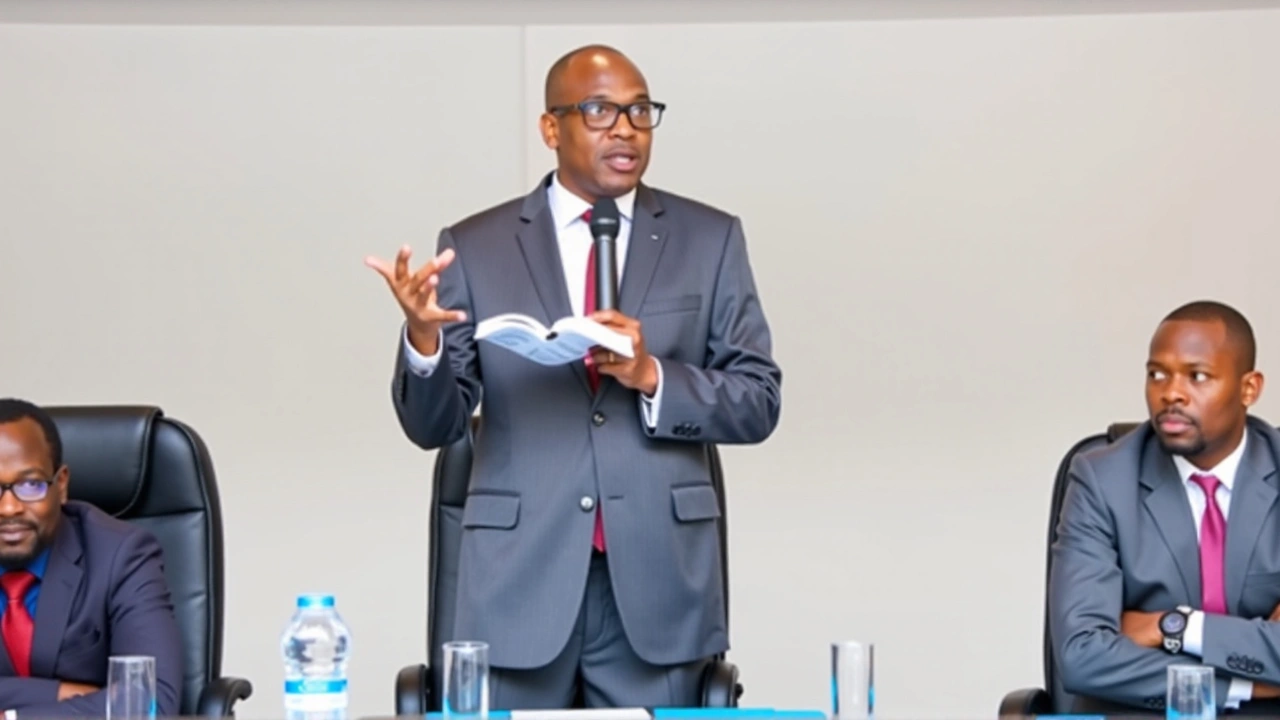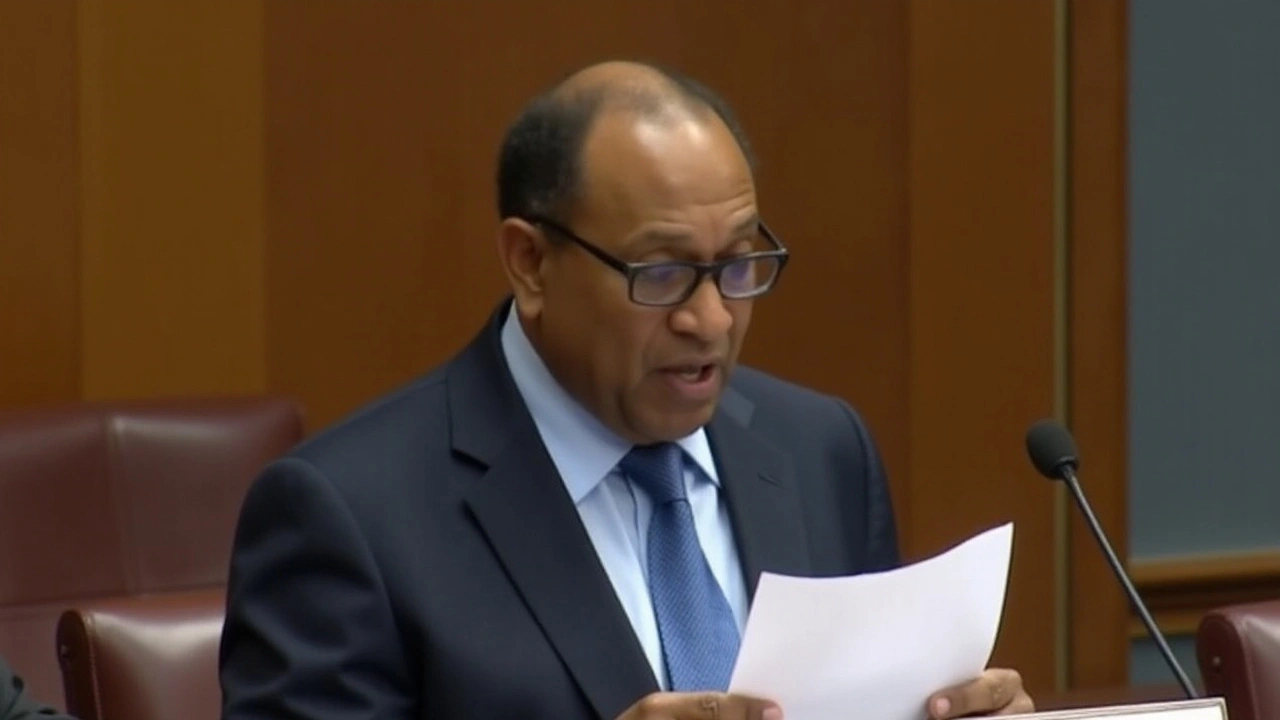Aden Duale Challenges Kenya Meteorological Department to Improve Forecasting Accuracy
In a decisive move, Environment Cabinet Secretary Aden Duale has presented a formidable challenge to the Kenya Meteorological Department (KMD). His emphatic call for improved accuracy and timeliness in weather forecasts is seen as a pivotal step towards bolstering the country's meteorological services. While acknowledging recent strides made by the department, Duale stressed that further enhancements are imperative to meet the expectations of Kenyans.
The accuracy of weather forecasts is not merely a scientific or technical concern, but a vital component that deeply affects various sectors. In agriculture, for example, precise weather predictions can spell the difference between a bountiful harvest and crop failure. Farmers, who rely heavily on weather forecasts to plan planting and harvesting activities, consider accurate weather predictions as indispensable assets. The unpredictability of weather patterns poses significant risks, and thus, the enhancement of forecasting capabilities is crucial for their livelihoods.
Similarly, transportation sectors including aviation, maritime, and road transportation are intrinsically linked to reliable meteorological information. The aviation sector, in particular, requires accurate weather information to ensure flight safety and efficiency. Sudden changes in weather can lead to flight delays, diversions, or even accidents. The importance of timely weather updates cannot be overstated in this regard. Maritime activities are equally dependent on weather forecasts to navigate and avoid potentially hazardous conditions at sea.
Emergency response operations also stand to gain immensely from improved weather forecasting. In scenarios such as natural disasters – floods, hurricanes, droughts – timely and precise weather alerts can save lives and reduce economic losses. Emergency services rely on accurate data to mobilize resources and strategize interventions effectively. The myriad of ways in which weather impacts the daily lives of citizens underscores the necessity of enhanced forecasting capabilities.
Recent Efforts and Public Trust
Duale noted that the Kenya Meteorological Department had made commendable progress in recent years. Improvements in technology and forecasting models have led to a noticeable increase in the accuracy of weather predictions. This has, in turn, fostered greater public trust in the department. However, as Duale highlighted, the journey towards achieving optimal forecasting standards is ongoing. The current advancements, while significant, are viewed as stepping stones towards an even more reliable meteorological service.
The public's growing trust in the Kenya Meteorological Department is both a testament to its successes and a motivator for future enhancements. People now expect more from the department – not only accuracy but also timeliness in delivering forecasts. In an age where information is readily available, delays in weather updates can negate the benefits of accurate predictions. Thus, Duale's emphasis on timeliness is particularly pertinent.
The Economic and Social Imperatives
Accurate and timely weather forecasting is not just about preventing inconveniences; it has profound economic and social implications. For instance, in agriculture, better forecasts can lead to optimized use of resources. Farmers can conserve water by scheduling irrigation during dry spells or prepare for heavy rains to prevent soil erosion. This optimization ultimately translates to cost savings and increased productivity.
In tourism, another vital sector for Kenya, accurate weather predictions can influence travel plans and tourism activities. Tourists rely on forecasts to choose the best times to visit various attractions, especially those rooted in nature like safaris and beach outings. Reliable weather information enhances the overall tourist experience and can boost the sector's contribution to the national economy.
Socially, accurate weather predictions contribute to the well-being and safety of the populace. Urban planners can design better drainage systems if they have reliable data on rainfall patterns. Health sectors can prepare for weather-induced illnesses, such as heatwaves leading to dehydration or cold spells exacerbating respiratory conditions. Thus, the benefits of improved meteorological services extend far beyond daily conveniences.

Government Commitment and Future Prospects
Duale's call for enhanced forecasting capabilities is part of a broader governmental commitment to elevate the quality of meteorological services in Kenya. The government recognizes the intrinsic value of accurate weather predictions and is keen on investing in the necessary infrastructure and training. This commitment is evident in the allocation of resources towards acquiring advanced forecasting equipment and sending meteorologists for specialized training.
The Kenya Meteorological Department, in response, is exploring various avenues to meet these heightened expectations. Collaborations with international meteorological organizations are on the horizon, intended to enable technology transfer and capacity building. Innovations such as the integration of artificial intelligence and machine learning into weather prediction models are being considered to enhance precision.
In conclusion, Aden Duale's challenge to the Kenya Meteorological Department is a clarion call for the prioritization of meteorological services. His insistence on accuracy and timeliness is not just a mandate but a reflection of the essential role that weather forecasts play in the country's economic and social framework. As the department continues to make strides, Kenyans can look forward to more reliable weather information that supports their daily activities and long-term planning.

jessica zulick
September 12, 2024 AT 00:30Improving forecast accuracy is a game‑changer for our farmers; when they know exactly when the rains will come they can plant at the optimal time and avoid devastating losses.
Accurate predictions also help them plan irrigation and fertilizer use, saving both water and money.
Partho A.
September 14, 2024 AT 13:13The push for timelier weather reports aligns with best practices in disaster risk reduction and agricultural planning, fostering resilience across sectors.
Jason Brown
September 17, 2024 AT 01:55One cannot overstate the significance of meticulous data assimilation in modern meteorology; every atmospheric observation, from satellite radiances to surface thermometers, must be integrated with impeccable precision.
Neglecting such rigor inevitably degrades forecast skill, which is why robust quality‑control protocols are indispensable.
Heena Shafique
September 19, 2024 AT 14:37While the department's recent strides are commendable, it would be remiss to celebrate without scrutinising the lingering latency in alert dissemination-a subtle irony, wouldn’t you say?
Patrick Guyver
September 22, 2024 AT 03:20Honestly, if the weather bureau kept dropping the ball on timely updates, you’d start seeing conspiracies about hidden climate agendas popping up faster than rain in a monsoon season!
Jill Jaxx
September 24, 2024 AT 16:02Spot on, they need faster updates!
Jaden Jadoo
September 27, 2024 AT 04:44When we stare at the sky, we’re confronting a living tapestry of chaos and order; refining our forecasts is akin to learning the subtle brushstrokes of that masterpiece.
Traci Walther
September 29, 2024 AT 17:27🌦️💡 Absolutely love seeing the push for better forecasts! It means fewer surprise storms for our picnics and more reliable planning for everyone. 🙌🚜✨
Ricardo Smalley
October 2, 2024 AT 06:09Well, isn’t it charming how we expect instant weather magic when the models are still wrestling with the same old physics?
Sarah Lunn
October 4, 2024 AT 18:51The notion that the meteorological service could be complacent is ridiculous beyond belief.
It is absurd to think that decades of scientific progress could be rolled back by a single bureaucratic lapse.
One must consider that weather models are calibrated with terabytes of data collected globally.
Ignoring the sophistication of these algorithms is tantamount to denying the very foundations of modern climatology.
Moreover, the suggestion that forecasts are merely guesses betrays a profound misunderstanding of statistical physics.
The department's recent upgrades to Doppler radar networks have demonstrably reduced error margins.
In agriculture, precise rain predictions translate directly into increased yields and reduced waste.
The aviation industry relies on microsecond updates to avert catastrophic incidents.
Any delay in disseminating such critical information endangers lives and disrupts economies.
It is therefore incumbent upon the government to allocate resources without hesitation.
Accountability mechanisms must be transparent, with performance metrics published quarterly.
Public trust is earned through consistency, not through empty proclamations.
The integration of AI models, while promising, must be accompanied by rigorous validation.
Citizens deserve forecasts that are both accurate and timely, not half‑hearted promises.
In short, the call for improvement is not a challenge but a necessity that should be met without excuse.
Gary Henderson
October 7, 2024 AT 07:34Got to say, the weather updates have been decent lately, but there’s always room for a quicker push on the alerts.
Julius Brodkorb
October 9, 2024 AT 20:16True, faster alerts can make a huge difference, especially for those on the front lines of emergency response.
Juliana Kamya
October 12, 2024 AT 08:58Let’s keep the momentum going-enhanced forecasting is the backbone of sustainable development, from agribusiness to tourism, and every sector wins when the sky’s secrets are shared promptly.
Erica Hemhauser
October 14, 2024 AT 21:41The call for “better” forecasts feels like moral grandstanding without concrete budget commitments.
Hailey Wengle
October 17, 2024 AT 10:23Honestly, they’re probably letting global elites keep the best data to themselves-another classic case of information hoarding!???!!!
Maxine Gaa
October 19, 2024 AT 23:06How might integrating community‑based weather stations enhance the granularity of forecasts for micro‑climates across Kenya?
Katie Osborne
October 22, 2024 AT 11:48Community stations could indeed fill observational gaps, offering real‑time data that improve model initialization and lead to more localized predictions.